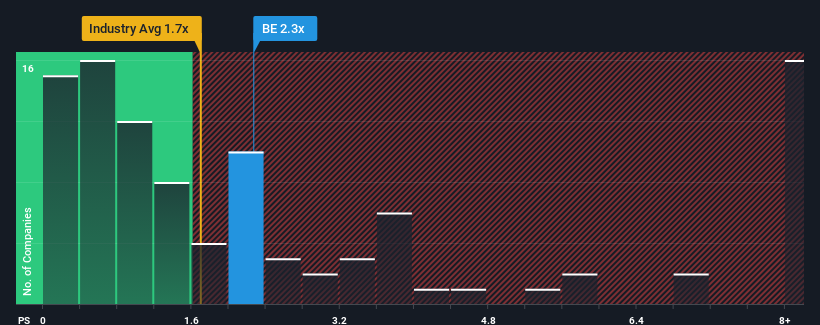- United States
- /
- Electrical
- /
- NYSE:BE
What Bloom Energy Corporation's (NYSE:BE) 34% Share Price Gain Is Not Telling You

Despite an already strong run, Bloom Energy Corporation (NYSE:BE) shares have been powering on, with a gain of 34% in the last thirty days. Not all shareholders will be feeling jubilant, since the share price is still down a very disappointing 13% in the last twelve months.
After such a large jump in price, given close to half the companies operating in the United States' Electrical industry have price-to-sales ratios (or "P/S") below 1.7x, you may consider Bloom Energy as a stock to potentially avoid with its 2.3x P/S ratio. Nonetheless, we'd need to dig a little deeper to determine if there is a rational basis for the elevated P/S.
See our latest analysis for Bloom Energy

What Does Bloom Energy's P/S Mean For Shareholders?
Recent times haven't been great for Bloom Energy as its revenue has been rising slower than most other companies. It might be that many expect the uninspiring revenue performance to recover significantly, which has kept the P/S ratio from collapsing. You'd really hope so, otherwise you're paying a pretty hefty price for no particular reason.
If you'd like to see what analysts are forecasting going forward, you should check out our free report on Bloom Energy.Do Revenue Forecasts Match The High P/S Ratio?
The only time you'd be truly comfortable seeing a P/S as high as Bloom Energy's is when the company's growth is on track to outshine the industry.
Retrospectively, the last year delivered virtually the same number to the company's top line as the year before. However, a few strong years before that means that it was still able to grow revenue by an impressive 56% in total over the last three years. So while the company has done a solid job in the past, it's somewhat concerning to see revenue growth decline as much as it has.
Looking ahead now, revenue is anticipated to climb by 24% per annum during the coming three years according to the analysts following the company. With the industry predicted to deliver 47% growth each year, the company is positioned for a weaker revenue result.
With this information, we find it concerning that Bloom Energy is trading at a P/S higher than the industry. Apparently many investors in the company are way more bullish than analysts indicate and aren't willing to let go of their stock at any price. There's a good chance these shareholders are setting themselves up for future disappointment if the P/S falls to levels more in line with the growth outlook.
The Key Takeaway
Bloom Energy shares have taken a big step in a northerly direction, but its P/S is elevated as a result. We'd say the price-to-sales ratio's power isn't primarily as a valuation instrument but rather to gauge current investor sentiment and future expectations.
It comes as a surprise to see Bloom Energy trade at such a high P/S given the revenue forecasts look less than stellar. The weakness in the company's revenue estimate doesn't bode well for the elevated P/S, which could take a fall if the revenue sentiment doesn't improve. At these price levels, investors should remain cautious, particularly if things don't improve.
And what about other risks? Every company has them, and we've spotted 2 warning signs for Bloom Energy you should know about.
Of course, profitable companies with a history of great earnings growth are generally safer bets. So you may wish to see this free collection of other companies that have reasonable P/E ratios and have grown earnings strongly.
Valuation is complex, but we're here to simplify it.
Discover if Bloom Energy might be undervalued or overvalued with our detailed analysis, featuring fair value estimates, potential risks, dividends, insider trades, and its financial condition.
Access Free AnalysisHave feedback on this article? Concerned about the content? Get in touch with us directly. Alternatively, email editorial-team (at) simplywallst.com.
This article by Simply Wall St is general in nature. We provide commentary based on historical data and analyst forecasts only using an unbiased methodology and our articles are not intended to be financial advice. It does not constitute a recommendation to buy or sell any stock, and does not take account of your objectives, or your financial situation. We aim to bring you long-term focused analysis driven by fundamental data. Note that our analysis may not factor in the latest price-sensitive company announcements or qualitative material. Simply Wall St has no position in any stocks mentioned.
About NYSE:BE
Bloom Energy
Designs, manufactures, sells, and installs solid-oxide fuel cell systems for on-site power generation in the United States and internationally.
High growth potential with mediocre balance sheet.
Similar Companies
Market Insights
Community Narratives



